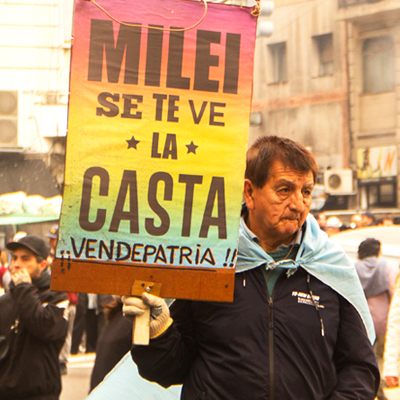David Castillo: Corruption and violence in Honduras
COPINH launched investigation about alleged mastermind of the murder of Berta Cáceres. He has links with extractive companies.

After 42 months of the political femicide of Berta Cáceres in Honduras, and while people await the definitive ruling against the seven men accused as the perpetrators of the crime and the beginning of the trial against David Castillo as one of the masterminds, the organization that was coordinated by the late Lenca indigenous leader (COPINH) launched a report that exposes the pattern of violence exerted by Castillo, manager of DESA company, along with the human rights violations and corruption that benefited the companies he is linked with.
During the event organized to launch the report «Violence, Corruption and Impunity in the Honduran Energy Industry: A Profile of Roberto David Castillo Mejía» in Tegucigalpa on September 4th, the daughter of Berta Cáceres and current coordinator of COPINH, Bertha Zúñiga, said that the Cáceres family have applied to a US federal court to subpoena bank records linked to a $1.6m house in Texas purchased by David Castillo, “in order to find out whether this purchase is related to some payment he could have received for murdering (or ordering to murder) Berta Cáceres”.
As pointed out to RWR by the International Observation Mission that monitored the trial over the murder of Berta Cáceres it is necessary to investigate the criminal structures behind this crime and other situations of persecution against social, peasant and indigenous organizations that reject the installation of extractive projects in their territories, as well as the role of companies and other perpetrators in the murders and acts of corruption between transnational corporations and governments.
“The report exposes the criminal structure that has benefited from this concession (to DESA) to obtain profits, a pattern seen not only in Agua Zarca, but in other energy projects in Honduras as well”, said Bertha Zúñiga.
Daniel Cerqueira, coordinator of the Human Rights and Natural Resources Program of the Due Process of Law Foundation -which promoted this report- urged the countries with a right to vote at the World Bank, the Inter-American Development Bank (IADB) or the International Monetary Fund -funds “that continue to inject money into Honduras for these projects”- to be critical of this funding because it implies human rights violations, such as against the right to life of people like Berta Cáceres, and increase public debt: “In the case of the state energy utility there are at least 500 million dollars in debt and the Honduran people have to bear the costs of this fraud and corruption”.
He also made reference to the fact that the US should apply to Castillo the “Magnitsky” Act that allows the US Treasury to freeze all assets of the people involved in human rights violations and corruption, effectively blocking their access to the US financial system.
“The report “Violence, Corruption and Impunity in the Honduran Energy Industry: A profile of Roberto David Castillo Mejía” exposes the role of companies and other perpetrators in murders such as the one of Berta Cáceres. In this case, we are sure that this crime committed by at least 7 men could not have been possible without additional actors: David Castillo being one of them, but we need to make reference to the direct participation of other State actors and how the funds Honduras receives from multilateral banks allow to finance this type of projects, which shouldn´t be considered “development projects” because they leave behind nothing but human rights violations and social conflicts in Honduras and other Latin American countries”.
Roberto David Castillo Mejía is a Honduran businessman, former government employee and former military intelligence officer who graduated from the US Military Academy at West Point in 2004.
The report launched today gathers information about his commercial activities and also describes his criminal activities, including serious human rights violations and significant acts of corruption while serving as government employee; in addition to being involved with Honduran and Panamanian companies.
Investigated as one of the masterminds of the femicide of Cáceres, he has been in pretrial detention since March 2018, but the trial is currently suspended.
“Evidence presented to Honduran courts by prosecutors suggests that Castillo participated in the murder of Berta Cáceres as an intellectual author, allegedly coordinating with, and presumably providing funds to, the material authors for the purpose of carrying out the murder”, states the report.
“The criminal activities attributed to Castillo were presumably undertaken to advance
the interests of corporations with which he was associated”, adds the report. “At least six companies were incorporated in Honduras and at least two companies associated with Castillo were registered in Panama, where the anonymity of their shareholders is protected”.
“Difficulties in obtaining access to the filings of some of the corporations, and laws allowing anonymity of ownership of companies registered in Panama, make it extremely difficult to ascertain the identity of the owners of several corporations mentioned in this report. This contributes to impunity for violence and obscures the manner in which international investors may benefit from corruption and violence in Honduras. Multiple corporations have apparently benefited from alleged crimes; those that would have benefited Desarrollos Energéticos S.A. (DESA) and related companies are particularly grave”, conclude the authors of the report.




